
The title says it all, folks. If you want a camera and lens combo that gets you to 2000mm, effectively, (without spending thousands of dollars, and/or using one or more teleconverters) …then you need to check out the Nikon P950!
This “compact” digital camera isn’t exactly compact. In fact, it’s bigger than a small DSLR with a kit lens. That’s because it has the full-frame equivalent of a 24-2000mm lens. An 83x zoom lens, that is pretty sharp throughout its entire zoom range, actually. Impressive, indeed! In this review, we’ll give you all the details about what makes this camera so fun and exciting to shoot with, but also how it might not live up to some expectations.


2000mm is an unheard-of focal length. In fact, most photographers probably think that’s a typo, and should read “200mm”, but, no… Two. Thousand. Millimeters.
You’re probably still struggling to grasp just how long of a telephoto focal length this is, and that’s understandable. Most photographers have never worked with a lens that goes further than 300mm, or maybe 400-600mm. Don’t worry, we’ve got plenty of samples of just how much “reach” the P950 has to offer! For starters, check out the opening clip in the video below.
MOUNTAIN DISTANCE: Nikon P950 Telephoto Zoom Sample
(NOTE: Most timelapse scenes were captured with other cameras, including the Nikon D780, Nikon Z50, and Nikon D750. Indeed, their raw image quality is much better than that of the P950, as is the 4K video quality on the Nikons that offer it. The P950 was only used to record the intro zoom-in footage, and two other super-telephoto clips throughout the video.)
Nikon Coolpix P950 | Specifications

Sensor Format & Type: 1/2.3″ (6.17 x 4.55 mm) CMOS
Fixed Lens: 24-2000mm equivalent, (83.3x) f/2.8-6.5 aperture
Megapixels: 16 (4608×3456)
Video: 4K (3840×2160) 30p/25p MP4 H.264
ISO Range: 100-6400
Autofocus: On-sensor contrast-detect AF, face detection, subject tracking
LCD Display: 3.2 in, 921,000 dots
EVF: 2.359M dots
Physical Construction: mostly plastic, some metal, not weather-sealed
Battery: EN-EL20a, rated to 290 shots (CIPA)
USB charging: yes, very slowly, while the camera is OFF only
Connectivity: Wifi, Bluetooth, USB 2.0 charging, (while camera is off) & microphone port.
Weight: 2.21 lb (1005 g)
Size/Dimensions: 5.52 x 4.31 x 5.9 in. (140.2 x 109.6 x 149.8 mm)
Price: $799 (B&H)
Nikon P950 Review | Who Is It Made For?

This is definitely one of the most unique cameras on the market today. It’s either a novelty item that you hear about and think, “hmm, that’s neat!” …and then forget about, OR, it’s a really exciting tool (or, let’s be honest, a toy) that you would love to get your hands on. The only question is, what type of photography do you do?
Wildlife Photography

A lot of different kinds of wild animals are best observed from a distance. If you’ve ever raised your 70-200mm or 70-300mm lens to your eye and felt disappointed that you still weren’t “close” enough to a very distant subject, well, look no further! This is the camera that might even get you TOO close.
Whether you’re photographing potentially dangerous wild animals such as bears or other large mammals from many yards/meters away, or you’re trying to get close-up with harmless but extremely shy, small animals, almost every type of wildlife photography could be where a camera like this is a ton of fun.
Astro-Landscape Photography
Nikon P950, 2000mm equivalent, Slik VARI CF tripod, 4K full-sensor, 4K cropped

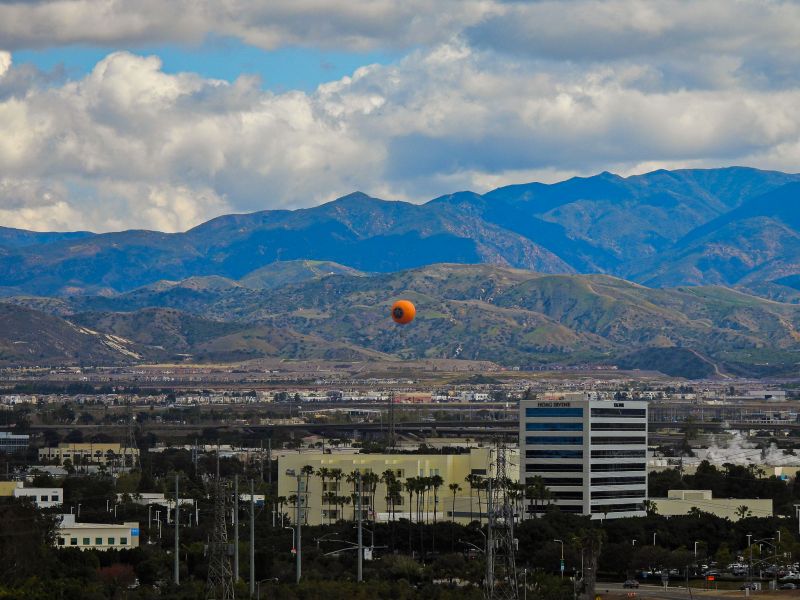
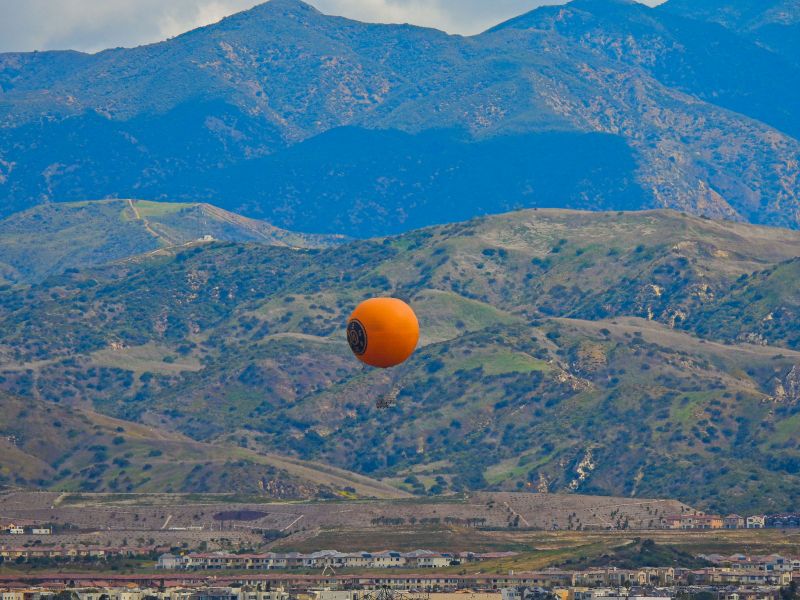


Landscape photography may not come to mind when thinking of “things to do with a 2000mm lens”, however, events and subjects such as serendipitously aligned moonrises or sunsets can be a lot of fun to photograph, too!
The P950 is definitely not very well-suited to traditional astrophotography, though, or even nightscape photography, due to its relatively tiny sensor. However, for “astro-landscape” and even traditional landscape & outdoor photography, this is simply one of the most lightweight ways to achieve such super-telephoto focal lengths.
Bird Photography (Birders)





Although the autofocus isn’t as robust as more expensive camera bodies and enormous dedicated telephoto lenses, there are still quite a few birding conditions where the subjects are perched, staying still, such that you can easily photograph them with the P950.
It’s definitely a great camera for watching a nest/perch from a great distance, so as not to disturb parents or their hatchlings.


To be fair, even BIF (birds in flight, for those of you who are not birders) is possible with the P950, once you get the hang of using the autofocus system, and if it’s daylight. Just know that if you want to photograph something like owls 30 minutes after sunset, well, …that’s what $12,000 “big gun lenses” are for.
(Casual) telephoto Action Sports Photography
Now, I have to say “casual” action sports photographers, because unlike both birds and wildlife, action sports relies much more heavily on a camera’s autofocus tracking capability, not just a lens’ reach/range. Therefore, considering the less robust autofocus system, it’s hard to recommend this camera as a truly serious action sports camera.
Having said that, if you need to reach 1000-2000mm for a specific shot, then you might as well consider the P950 to be an option. In other words, if you’re a serious telephoto action sports photographer with important shots that you must capture, then consider this camera to be that 3rd or 4th camera you set up, just in case it can deliver a truly unique perspective with its amazing lens. But, don’t trust it to capture a truly critical moment as your primary camera angle.
…People who want to prove flat-earthers wrong, or investigate chemtrails?


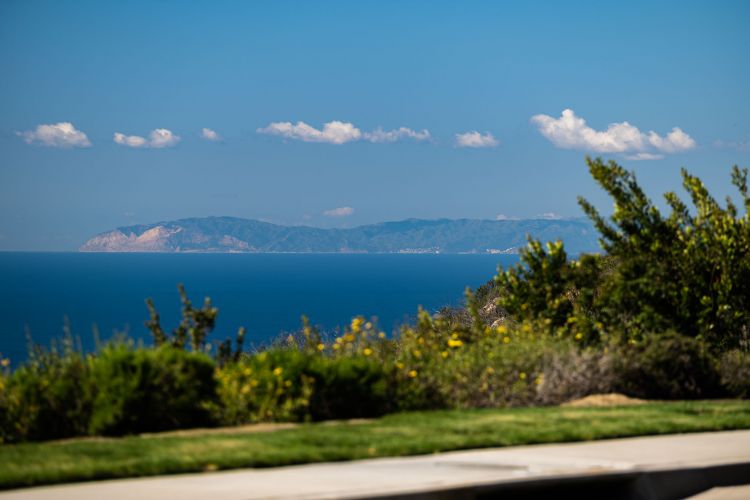
If you live somewhere with a lot of very clear weather, especially somewhere along the coast, then you might just be able to do a little casual, un-scientific flat-earth “research” just for fun. With a 2000mm lens, and a lot of free time, you might be able to observe things like ships disappearing over the horizon on a crystal clear day, or more static, distant subjects from various elevations above sea level.
Also, if you live somewhere with a lot of air traffic high overhead, (usually jumbo jets above 30,000 ft) …then you might also be able to entertain yourself by shooting close-ups of contrails, AKA chemtrails if you believe in conspiracies.



OK, seriously folks, this is just a REALLY FUN camera to play around with. I don’t care if you do or don’t believe in conspiracies, by the way, because no matter what, this camera makes a very useful tool.
All in all, if you enjoy capturing highly unique perspectives of relatively commonplace subjects, then this might be the type of camera that makes you feel truly excited about photography again! You’re welcome.
Nikon P950 Review | Pros
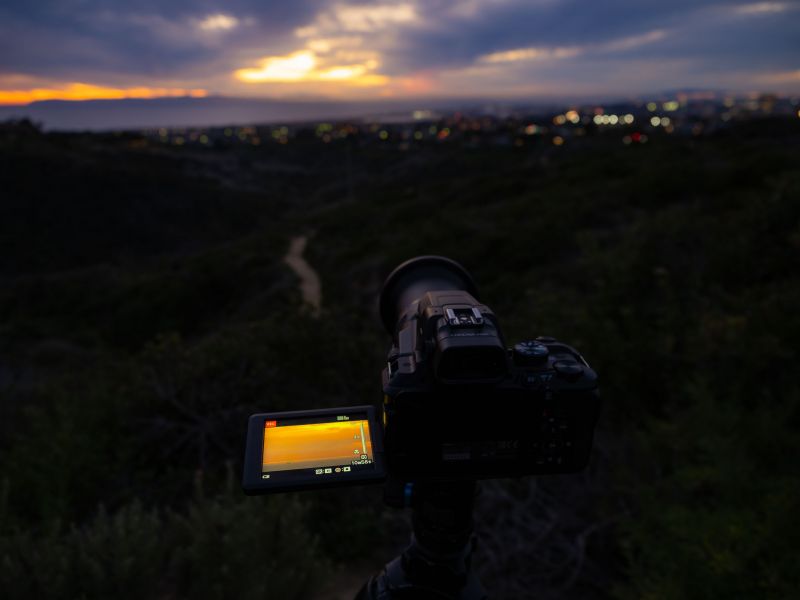

As such a unique, highly specialized camera, let’s make one thing clear, if it isn’t already: this camera is not for everybody, and the biggest reason to get it is very much dependent upon your interest in super-telephoto photography. It’s really that simple.
With that in mind, if you’re feeling at all interested in this camera, here’s what you can expect to be excited or happy about:
The 2000mm Zoom Reach

First and foremost, indeed, is that reach. You just don’t realize how long 2000mm is until you experience it for the first time. Heck, even after the 10th or 20th time, I was still shocked by how “close-up” subjects would become when zooming all the way in.
Surprisingly, by the way, the lens is tack-sharp throughout its entire zoom range, even at 2000mm. Well, the lens itself is very sharp, however, images are only as sharp as can be with a very small sensor. (Hint: diffraction. We’ll talk more about it soon.)


Also, if you’ve never seen video captured at 1000-2000mm, atmospheric distortion can make a scene appear as if you’re peering through a rippling reflection on water. Even on a relatively cold day, if the sun is shining then all subjects farther away than a mile or two will not make for a fair test of the lens’ sharpness.


Of course, with a close-up subject, it is easier to see just how sharp the P950’s lens is, even at 1000-2000mm. So, yes, the lens is very sharp, despite the inherent limitations of trying to shoot at the equivalent of 2000mm with such a small sensor camera.
Portability
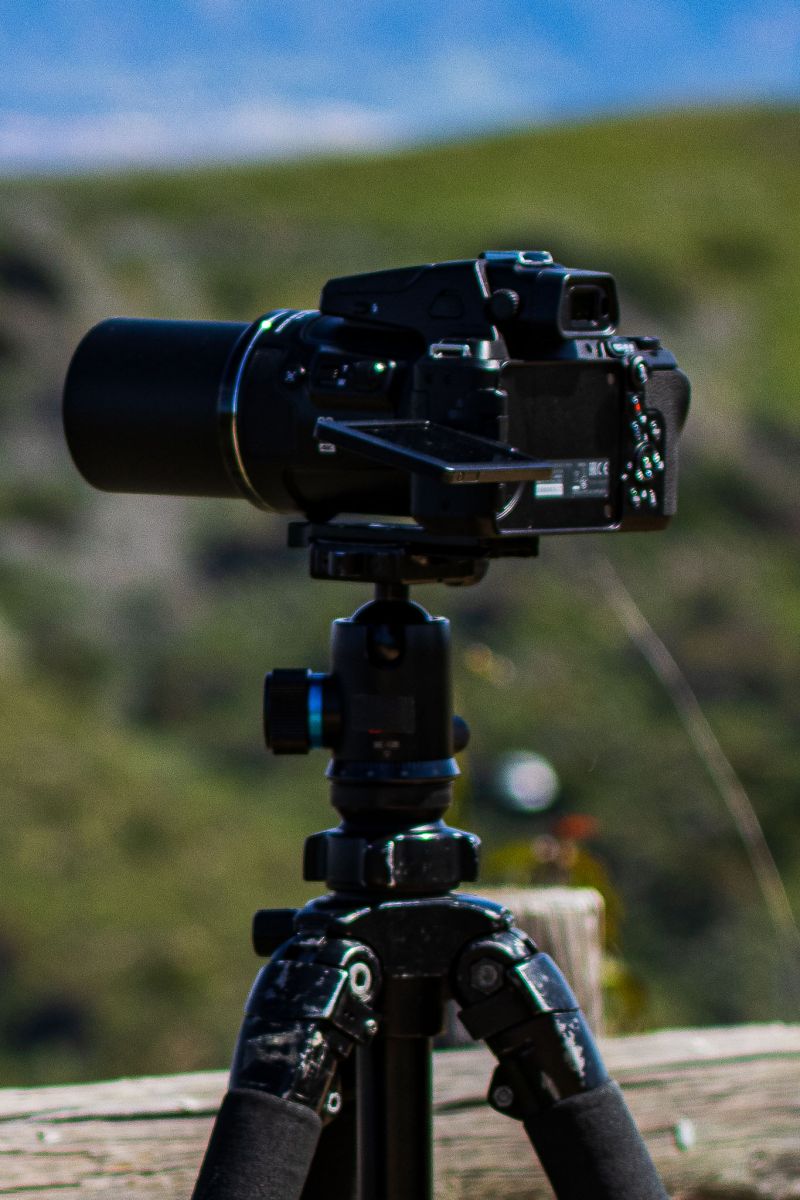
You simply can’t get past 300/400mm with most common compact camera setups. We’ll discuss a few competing options later, but suffice it to say, the portability of this camera is unprecedented.
It is certainly much bigger than most other “compact” cameras on the market, and you definitely can’t just slip it into a jacket pocket, but it’s still extremely small.
- The dimensions of the Nikon P950 (~$800) are: 5.52 x 4.31 x 5.9 in. / 140.2 x 109.6 x 149.8 mm.
The weight of the P950 is: 2.21 lb / 1005 g - The dimensions of a Nikon 200-500mm f/5.6 (~$1300) are: 4.25 x 10.53 in. / 108 x 267.5 mm.
The weight of the 200-500mm is: 5.07 lb / 2.3 kg - The dimensions of a Nikon 500mm f/5.6 PF($3600) are: 4.17 x 9.33 in. / 106 x 237 mm
The weight of the 500mm PF is: 3.21 lb / 1460 g
In other words, even without a camera or teleconverter attached, the Nikon 200-500mm is nearly twice as long, and more than twice the weight, of the P950.
Value


Speaking of comparisons against other super-telephoto options, the price point exhibits just as dramatic a difference as the size/weight factors. The Nikon P950 is at least $500 cheaper than many zoom lenses that reach 500mm or 600mm, and likely at least $1000 cheaper if you include a camera body.
Oh, and the latest Nikon 2x teleconverter (mk3) and Nikon 1.4x teleconverter (mk3) are both another $500, too. Plus, adding a teleconverter costs you 1-2 stops of light, and can have a negative effect on your overall image quality and autofocus reliability, of course.
We won’t even bother mentioning the prices of super-exotic lenses such as the Nikon 600mm f/4 or the Nikon 800mm f/5.6, because they are definitely in an entirely different league, no, a different universe, from this $800 Coolpix camera. (Hint: you could buy more than a dozen P950’s!)
Raw Image Capture
Unlike the Nikon predecessors that reached 2000mm, this Coolpix camera isn’t limited to JPG image files. You can now capture NRW (not NEF) raw files, and this affords a lot more leeway when it comes to post-production.
Don’t get too excited, though; while raw editability is nice, the actual image quality itself has quite a few caveats, which we’ll get to in the “cons” section soon.
Suffice it to say, this camera’s raw file format does make it a more usable camera compared to its JPG-only predecessor, the P900.
4K Video
Much like the P950’s ability to capture raw files, its ability to capture 4K (30p) video is very welcomed, even though its actual image quality isn’t jaw-dropping.
Doing a few image quality comparisons between 4K video from the P950 and the new Nikon D780 or the Nikon Z50, you will see noticeably increased fine detail (in other words, no mushy-ness at all) from the larger sensor cameras.
Still, it’s nice to have the 4K 30p video, and it’s nice that it approximately covers the full-width of the sensor.
Nikon P950 Review | Cons
There is definitely no such thing as a free lunch here. As we have already hinted at in the pros section above, getting to 2000mm in such a small package, at such an affordable price, does not come without its drawbacks…
Beginner-Oriented Interface & Customizability

When getting to know the P950, the first thing that anyone familiar with Nikon cameras will notice is that the physical controls and menu interface aren’t nearly as extensive as most other Nikon cameras. A lot of controls are simply different, and not as seamlessly integrated into the physical controls as with a Nikon DSLR or mirrorless camera.
Basically, a lot (though not all) of the necessary controls, including ISO, AF point selection, and White balance are all contained within the Fn button that is adjacent to the shutter release, and the pop-up menu that controls these settings is a bit awkwardly designed.
A few buttons can be re-programmed to perform certain functions, but there are fewer customizable buttons compared to other Nikon cameras, and there are fewer options available for the buttons that are customizable.
All in all, the camera is definitely opting for a simple interface, which might be good if you don’t plan to extensively control a lot of different settings anyway. However, if you’re already well-accustomed to a more advanced Nikon DSLR or mirrorless camera, but you’re getting this camera specifically for its unique zoom range, then the limitations to control and customization will likely be the biggest drawback for you.
Image Quality

Yes, that’s right, image quality is going in the “cons” section of a camera that I actually like and (spoiler alert!) am going to recommend at the end of this review.
So, you have two questions: First, how good (or bad) is the image quality, and second, …why would I still like the camera let alone recommend it to others? The answers are very simple:
First, let’s compare the image quality to some APS-C (Nikon DX) cameras, which are likely the next-closest thing to anyone who already shoots Nikon and is looking to go super-telephoto:
At ISO 400, the Nikon P950’s image quality is about as good as a Nikon D500 or Z50 at ISO 3200 or 6400. Ouch! Then, by ISO 800 on the P950, you’re clearly better off with a D500 or Z50 at ISO 6400. That’s a 4-stop differential.
Second, why is this camera still worth considering, if the “good image quality range” is limited to ISO 100-400, and images still aren’t as sharp as with an ILC? (Interchangeable Lens Camera, meaning both DSLR and Mirrorless) …Because no other cameras can get to 2000mm as conveniently as this. If you need 1000-2000mm worth of telephoto “reach”, then this is one of your best options.
Last, there is one more disadvantage to mention that is related to the laws of optics in general. Just like atmospheric distortion, which we can’t blame on the camera at all, diffraction is a law of optics that will soften your images no matter how sharp a lens is. Unfortunately, with the small, 16-megapixel sensor of the P950, diffraction is already going to be present even at f/5.6-6.5 when you’re zooming in and leaving the aperture wide-open.
While it is true that no other lens out there can get you to 2000mm at a faster aperture, you could at least enjoy less diffraction if you had a full-frame or even APS-C sensor with which to get there.
High-FPS Image Resolution

Here’s something that I found to be disappointing, for those who are looking to capture still images at the highest-possible FPS: If you switch from RAW to JPG, you gain access to high-speed “60” and “120” modes, which appear to capture a 1-second, 60 or 120 FPS burst.
Unfortunately, that burst of images is captured at an extremely low resolution, just 2 megapixels for the “60” mode, and a mere VGA resolution (that’s 640×480 pixels) for the “120” mode.
In other words, unless you have something EXTREMELY fast to photograph, (such as a hummingbird’s wings!) …you’re probably better off either sticking to the camera’s full-resolution 7FPS, or just shooting 4K video and then grabbing frames in post-production.
Battery Life & USB Charging/Power Options

The P950 is lucky if it gets about 20-30 minutes worth of 4K video recording out of a fully-charged battery. Not only that, but unlike many other cameras these days, it cannot be operated directly via USB power; the camera can only charge its battery via USB while the camera is off.
We really hope that Nikon is R&D-ing direct USB power for all of its cameras. It would be fantastic to allow relatively rapid charging via traditional 5-volt USB protocols, like Sony has been offering via its micro USB compatible port and/or its USB-C port, however if 9-volt, 3-amp USB-PD is the future, we’d absolutely be happy with that, of course.
Nikon P950 Review | VS The Competition
So, what other compact cameras can achieve such incredible zoom ranges? Not many. Most compact cameras with slightly larger sensors don’t come close to reaching 2000mm; the Sony RX10 IV, the latest (2017, that is… so, the last?) in a very popular line of cameras in the 1″ sensor category, only reaches 600mm equivalent. That’s an impressive reach, though, for such a compact camera, (and the autofocus is probably the best of any compact super-zoom camera around!) …that is, if you’re willing to spend a whopping $1700.
Or, if you want to get as long of a telephoto zoom as possible, but are on an extremely tight budget, the Nikon Coolpix B600 costs less than $300, and has a zoom lens equivalent to 24-1440mm. (The sensor is about the same, by the way.)

Last but not least in the compact camera realm, the Nikon Coolpix P1000 (~$1000) actually manages to one-up the P950, despite being a slightly older camera: its zoom range is equivalent to 24-3000mm! It too offers raw NRW capture and 4K video, however, the added zoom range from 2000mm to 3000mm is so incredibly long that you might not actually need it as much as you think. Plus, the P1000 is even larger than the P950, which is already rather oversized as far as “compact” cameras go.
Remember, you could get to the full-frame equivalent of ~1000mm on a DX (1.5x crop) camera by simply adding a 1.4x teleconverter to a medium-large, relatively affordable telephoto zoom lens that reaches 500mm. Or, for a truly impressive level of reach on a DX camera, just put a 2x teleconverter on a telephoto lens that reaches 600mm, and you’re at ~1800mm equivalent.
Just don’t forget, of course, that those alternatives are even larger, and far more expensive, a P950.
Nikon Coolpix P950 Review | Conclusion


We already gave you the most concise, summed-up version of this review at the very beginning: If you want a portable camera+lens that can zoom to 2000mm and shoot raw images and /or 4K video, this is your best option, like it or not.
If you’re really serious about very good image quality at “only” 1200-1800mm, however, and plan to do a lot of shooting in low light and/or at ISO 3200-6400, then you might be inclined to grab yourself a Nikon D500 or Z50, plus the decently portable 200-500mm f/5.6 and a 1.4x or 2x teleconverter. Great idea! I wouldn’t hold it against anyone who did go that route.
However, keep in mind that in the grand scheme of light-gathering equivalence, the Nikon P950’s inferior image quality (versus a D500 or Z50) isn’t going to be as big of a deal-breaker as you think.
Partly because adding a 2X teleconverter to an f/5.6 200-500mm DSLR lens would leave you at f/11, compared to the P95’s f/6.5 aperture at 2000mm, or f/5.6-6.3 at 800-1000mm.
Also, of course, partly because quite honestly there’s a good chance that most of the photos you capture are only ever going to be more of a novelty item, likely to be viewed on Instagram or Facebook at a mere 1080p or 2048-pixel resolution.
In other words, just be honest with yourself: what are you really going to do with these images, and how important is portability and/or affordability to you?


Personally, I found the P950 to be just so much fun to play with, that I absolutely would spend $800 on one, as a source of photographic entertainment, observation, and really cool pictures for my Instagram. Might the novelty wear off after a while? It could, but that’s a challenge that all artists face, with any unique, specialized tool that is at their disposal. Challenge accepted!
For some photographers, though, the significantly better image quality and professional controls of a DSLR or mirrorless body+lens might be worth it. (And, in the case of the Nikon D500, you get a truly flagship autofocus system!)
Hopefully, you already know which setup is right for you. If your mind is made up, leave a comment below and let us know what your preferred method of getting “super-ultra-telephoto” focal lengths is.
What you still may not fully grasp yet, despite my best efforts, is just how FUN this camera can be. Seriously, it’s really, really fun. Despite the quirks and limitations, I would absolutely recommend it.
Check Pricing & Availability Here
7.1 Score
Pros
- Zoom Range - it goes to 2000mm!
- Portability
- Affordable Value
- Proves flat-earth conspiracy wrong?
- Raw image format & 4K video
Cons
- Entry-level interface, customization, & autofocus
- Overall Image quality
- Battery life & charging
- Highest FPS image resolution
Final Verdict
It's highly unique, offers only one main selling point, and isn't very good compared to most large-sensor cameras, ...but if you want what it offers, it's one of the most fun cameras you'll ever own!
Matthew Saville
Follow his wilderness nightscape adventures on Instagram: instagram.com/astrolandscapes




Get Connected!